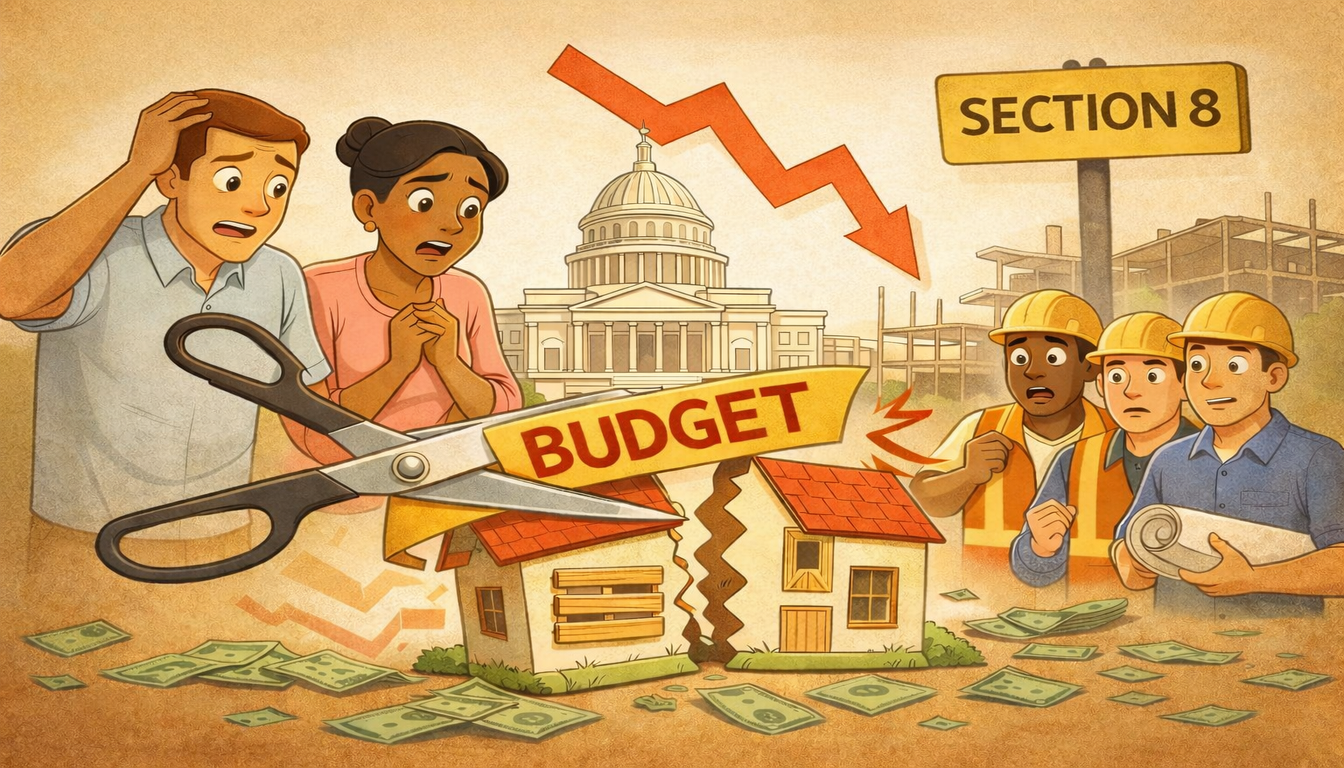The End of SOAR: What Cuts to Disability Benefits Mean for Affordable Housing and Section 8 Renters

In October 2025, major changes hit the disability benefits system in the United States—and they’re already rippling through the affordable housing world. The federal government has ended funding for a key program called SOAR (SSI/SSDI Outreach, Access, and Recovery), which for years helped thousands of people with disabilities get approved for Supplemental Security Income (SSI).
For many renters and landlords who rely on federal housing programs like Section 8, this change could bring new challenges. When people lose access to SSI, they often struggle to pay rent, maintain housing stability, and meet program requirements. Here’s what these changes mean for renters, landlords, and the broader affordable housing system—and what you can do now to stay ahead.
What Was the SOAR Program?
The SOAR program was designed to make the disability application process simpler and faster. Many people with disabilities find applying for SSI or SSDI benefits overwhelming—there are long forms, strict medical documentation rules, and complicated eligibility requirements. SOAR gave nonprofits, housing caseworkers, and local agencies the training and tools to guide applicants through the system.
This program was especially important for people who were homeless or at risk of homelessness. For them, getting SSI wasn’t just about monthly income—it was the key to qualifying for stable housing and rental assistance, including Section 8 vouchers and other affordable housing programs.
Without SOAR’s guidance, many people may now face a confusing, drawn-out process that could delay or even prevent them from getting the disability benefits they depend on.
Why This Matters for Renters on Section 8 or Other Housing Programs
For renters with disabilities, SSI payments often make the difference between having a home and living on the street. SSI is steady income that helps cover basic needs, including rent contributions under Section 8 and similar programs.
When that income disappears or becomes harder to get, renters can fall behind on rent—even if they’re part of a housing assistance program. Delayed or denied SSI claims can also affect eligibility for some housing programs that use income verification to determine assistance levels.
In short: fewer people getting approved for SSI means more people struggling to qualify for or maintain affordable housing.
Many local housing authorities and nonprofits have already started to see an increase in tenants who can’t keep up with their portion of rent or who are at risk of losing their vouchers.
How This Impacts Landlords in Affordable Housing Programs
Landlords who participate in Section 8 or other federal housing programs depend on predictable payments from both the housing authority and the tenant. When tenants lose SSI income, landlords may experience more late or missed payments.
This situation also makes it harder to fill vacancies. Some renters who would normally qualify for a housing voucher or rent assistance program may now fail income or documentation checks because their disability claims are stuck in limbo.
Landlords might also see longer approval times as local agencies adjust to new workloads and more complicated cases. In some cities, housing authorities are already facing backlogs because fewer staff are trained to help tenants navigate the system without SOAR’s resources.
The result: more uncertainty, more administrative delays, and more empty units in a market that desperately needs affordable housing.
A Chain Reaction in the Affordable Housing Crisis
Ending the SOAR program affects more than just the individuals applying for SSI. It adds new pressure to an already strained housing system. Here’s why:
- More people may become homeless. Without SSI income or guidance, people with disabilities who lose jobs or housing have fewer options for support.
- Public Housing Authorities (PHAs) face added stress. When more people fall behind on rent or lose eligibility, PHAs must handle more emergency cases and transfer requests.
- Landlords lose confidence in voucher programs. Uncertain or unstable payments discourage property owners from participating in affordable housing programs.
- Waiting lists grow even longer. As more people lose income and stability, the demand for Section 8 vouchers increases—but the supply remains limited.
This chain reaction makes the affordable housing crisis worse for everyone—renters, landlords, and housing agencies alike.
What Renters Can Do Now
Even with SOAR gone, renters still have ways to protect themselves and find support:
1. Seek out local or nonprofit help.
Some community organizations still offer assistance with disability benefit applications. They may not call it SOAR, but they can help you gather paperwork and submit claims.
2. Stay in contact with your housing authority.
If your SSI application is delayed or denied, let your Public Housing Authority (PHA) know immediately. In some cases, they can adjust your rent temporarily or connect you with short-term aid.
3. Keep your documentation up to date.
Keep copies of your medical records, income statements, and any SSI paperwork. You’ll need these for both benefit applications and Section 8 renewals.
4. Search for voucher-friendly housing early.
If you need to move, check out Section 8 listings. It’s a simple way to find apartments and landlords who accept vouchers in your area, so you can stay within program guidelines and avoid losing your spot.
5. Get reliable, easy-to-understand help.
If you’re confused by the rules or don’t know where to start, tools like Affordable Housing Assistant can make a big difference. It’s an AI-powered housing help tool that gives clear, step-by-step answers to your questions about Section 8, SSI, and affordable housing—without long waits, complicated jargon, or expensive consultant fees.
How to Check if Your Disability Benefits Are Affected
If you already receive SSI or are applying for it, it’s important to confirm whether your benefits are safe or if your payments might be delayed. Here’s how you can check:
- Log in to your Social Security account. Visit ssa.gov/myaccount to see your current benefit status, payment history, and notices. This is the fastest way to confirm if your SSI or SSDI benefits have changed.
- Check your mail and online messages. The Social Security Administration (SSA) sends notices before making any change to your payments. Look for letters or secure messages that mention “benefit change,” “review,” or “redetermination.”
- Call the SSA directly. If you’re unsure, contact the SSA at 1-800-772-1213 (TTY 1-800-325-0778). Wait times can be long, so it’s best to call early in the day.
- Talk to your caseworker or housing authority. If you receive Section 8 or other rental assistance, your housing authority may be notified of changes to your income. They can confirm whether your SSI has been reduced or paused.
- Use a housing help service. If you need help understanding letters or paperwork, you can use Affordable Housing Assistant to get plain-language explanations and guidance on what to do next.
Checking your status regularly can prevent surprises and help you act quickly if your benefits are cut or delayed.
What Landlords Should Do
1. Stay flexible and informed.
Recognize that many renters are facing longer wait times and delays outside their control. Open communication builds trust and helps prevent unnecessary evictions.
2. Maintain detailed records.
Keep copies of lease agreements, payment histories, and correspondence with your tenants and local housing offices. This protects both you and your renters if disputes arise during this uncertain period.
3. List your units wisely.
Keep marketing your affordable units to renters who already have approved vouchers. Using Section 8 listings can help you reach renters faster.
4. Educate yourself about housing changes.
HUD rules can shift quickly, especially during periods of political change. Following official updates on HUD.gov and your local housing authority’s website helps you stay prepared.
5. Connect renters to support.
If your tenants seem confused or stressed about their benefits, guide them toward resources like Affordable Housing Assistant, which can explain the steps they need to take next.
Looking Ahead: Will the System Adjust?
Some states are trying to fill the gap left by SOAR by setting up their own local versions of the program. However, many of these efforts are small and underfunded. For now, most advocates expect that fewer people will successfully apply for SSI and that more will lose out on benefits they would otherwise qualify for.
The long-term impact could include higher rates of homelessness, increased pressure on shelters, and growing frustration among landlords who rely on consistent rent payments from Section 8 tenants.
There’s also concern that if renters fall behind on rent because of delayed SSI benefits, it could hurt their ability to stay in housing programs. Once a tenant loses a voucher, it’s extremely difficult to get another one.
For landlords, these trends could mean longer vacancy periods, more tenant turnover, and less confidence in federal housing programs overall.
A Time for Patience and Preparation
Both renters and landlords need to approach the next few months with patience and awareness. Affordable housing in America was already stretched thin; the loss of SOAR just makes it harder for those who depend on disability benefits to stay housed.
If you’re a renter, keep pushing forward with your applications and paperwork—don’t give up even if the process feels slow. If you’re a landlord, stay open-minded and supportive toward tenants who are doing their best under difficult circumstances.
The housing system may be changing, but with the right information and resources, it’s still possible to navigate it successfully.
Need help understanding Section 8 or other affordable housing options? Visit Affordable Housing Assistant for free, easy-to-understand guidance.
Looking for voucher-approved rentals near you? Search Section 8 Listings and stay ahead in finding or filling your next home.
Navigating the Section 8 housing process can feel overwhelming, and that's where Section 8 Search comes in. We're more than just a listing website; we're a dedicated resource designed to make finding housing under the Housing Choice Voucher Program straightforward and stress-free. Our platform offers user-friendly tools to explore listings and waiting list statuses nationwide, all built on official HUD data. We're also passionate about providing clear, helpful information and guidance, empowering you with the knowledge you need to understand eligibility, complete your application, and confidently navigate your housing journey.








.png)
.png)
.jpg)



.png)
.png)
.png)



